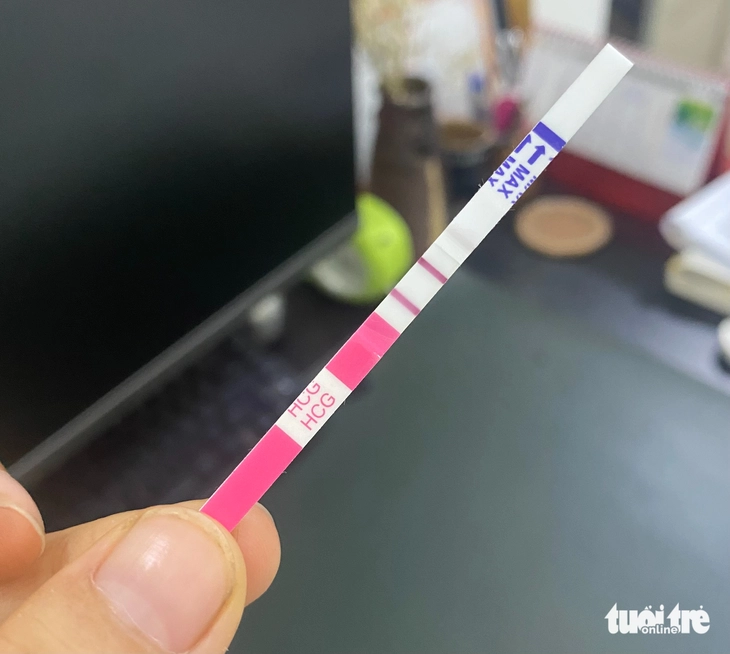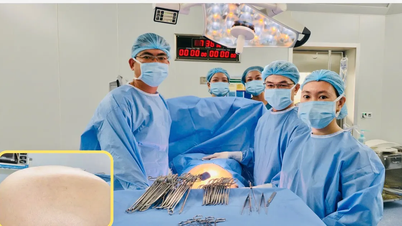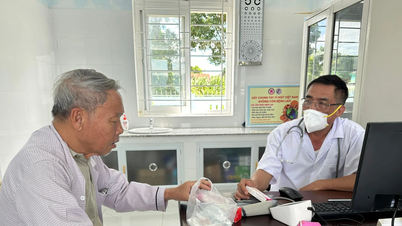
Testing too soon after embryo transfer can give inaccurate results because of the "presence" of the ovulation injection - Photo: X.MAI
The two-week wait for results after embryo transfer is a big challenge for infertile couples. Many people consider this the "longest period of time", when emotions of anxiety and hope are mixed together, not knowing whether the embryo will successfully implant and implant.
The story of an actress’s journey to find her child in Ho Chi Minh City recently touched many people. How families can successfully overcome that process is a story that many people are interested in.
Time seemed to stop, guessing every sign of the body
After 2 years of "letting loose" but not getting pregnant naturally, Ms. TB (31 years old, living in Ho Chi Minh City) and her husband decided to do in vitro fertilization. After going through a series of procedures from examination, testing, check-up, ovulation stimulation injection, to anesthesia, egg retrieval and embryo creation, Ms. B. was finally able to transfer the embryo.
However, the post-embryo transfer period was the most stressful time for her. Luckily, right from the first embryo transfer, Ms. B. and her husband had good news and now the baby is over 1 year old.
Recalling those days of waiting, Ms. B. still clearly remembers the feeling of anxiety and nervousness, each passing day felt heavy as if it were endless.
"This was an extremely long time. Every dull abdominal pain or unusual sign made me worried, wondering if the embryo was implanting or not. I searched for information online almost every day, and then became more confused," she recalled.
This two-week wait is even more difficult for couples who have failed IVF before. Some stay at home for fear of harming the embryo, drowning in negative thoughts due to previous failures.
According to Dr. Duong Khue Tu - Infertility Department, Tu Du Hospital (HCMC), after a period of rushing around to get injections and check-ups, couples can only wait for the results. These two weeks often pass with a feeling of being very long. Therefore, understanding this stage will help them to be less stressed and more relaxed.
Explaining why it takes two weeks to wait, Dr. Tu said that after embryo transfer, the body needs about two weeks for the ovulation injection to completely disappear and for pregnancy hormones to appear at a level sufficient to be detected by testing.
If you take a pregnancy test early in this period, the results may be inaccurate and you may feel more discouraged, so it is important to understand your body and psychology during the two-week wait.
"During IVF treatment, you will be given a variety of medications to help your eggs develop and create favorable conditions for the embryo to "make a home" in the uterus.
However, the side effects of these drugs such as nausea, breast tenderness, light bleeding, bloating... are quite similar to the symptoms of pregnancy. Combined with the desire to have a baby, you will tend to be overly sensitive to these symptoms and always wonder if you are pregnant or if it is just the medicine," Dr. Tu explained and gave an example.
Two things to avoid: Obsessing over pregnancy symptoms, staying indoors all the time
Doctor Tu said that there are two inappropriate things that most people do after embryo transfer and should avoid: being obsessed with pregnancy symptoms and staying at home all the time.
When too focused and worried about signs such as nausea, breast tenderness, light bleeding or bloating, many women easily mistake these as signs of pregnancy. These symptoms can come from side effects of medication or hormonal changes, and cannot confirm whether or not you are pregnant.
If you still find it difficult to get rid of this obsession, you can try simple deep breathing exercises to calm down.
In addition, after embryo transfer, many women tend to stay at home because they are afraid that moving will "drop" the embryo, thinking that absolute rest will increase the chance of pregnancy. This tendency is even more obvious in people who are inherently introverted.
However, this may not be effective, and may even make you more stressed because you only focus on waiting. Instead, you can consider going out for a light walk or meeting friends to help your mind relax and your body recover quickly.
About 1 million infertile couples
According to statistics from the Ministry of Health , it is estimated that Vietnam has about 1 million infertile couples, accounting for about 7.7% of couples. In particular, secondary infertility (infertility after one pregnancy) accounts for 3.8%. It is worth noting that this rate is increasing by 15-20% every year and accounts for more than 50% of infertile couples.
Source: https://tuoitre.vn/lam-sao-vuot-qua-thoi-gian-cang-thang-va-hoi-hop-tren-hanh-trinh-tim-con-bang-ivf-2025082911361761.htm







































































































Comment (0)